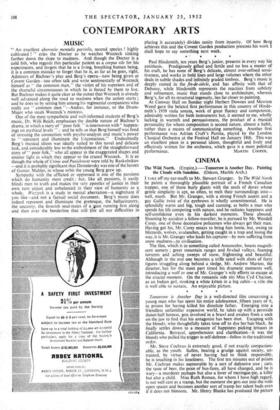CONTEMPORARY ARTS
MUSIC
" AN excellent aberratio mentalis partialis, second species ! highly cultivated ! " cries the Doctor as he watches Wozzeck sinking further down the slope to madness. And though the Doctor is a cold fish, who regards this particular patient as a corpus vile for his experiments, and forgets that he is a living, breathing human being, it is a common mistake to forget that he is, as far as he goes, right. Admirers of Buchner's play and Berg's opera—now being given at Covent Garden—too often talk and write sentimentally of Wozzeck himself as " the common man," the victim of his superiors and of the shameful circumstances in which he is forced by them to live. But Bilchner makes it quite clear at the outset that Wozzeck is already well advanced along the road to madness when the action starts ; and he does so by setting him among his regimental companions who really are " common men "—Andres, for instance, or the Drum- Major who steals Wozzeck's mistress.
One of the most sympathetic and well-informed students of Berg's music, Dr. Willi Reich, emphasises the double nature of Biichner's drama, in which a story of "poor folk " is interwoven with" happen- ings on mythical levels " ; and he tells us that Berg himself was fond of stressing the connection with psycho-analysis and music's power to " represent and illuminate the Unconscious." Undoubtedly Berg's musical idiom was ideally suited to this novel and delicate task, and considerably less to the embodiment of the straightforward story of " poor folk," who all appear in the exaggerated shapes and sinister light in which they appear to the crazed Wozzeck. It is as though the whole of Crime and Punishment were told by Raskolnikov —and it is probably significant that Dostoievsky was one of the heroes of Gustav Mahler, in whose orbit the young Berg grew up.
Sympathy with the afflicted or oppressed is one of the passions which do humanity most credit ; but, like all passions, it easily blinds men to truth and makes the very apostles of justice in their own turn unjust and unbalanced in their view of humanity as a whole. Wozzeck is a study in mental aberration—a nightmare if you like—and not a factual social document. Berg's music does indeed represent and illuminate the grotesque, the hallucinatory, the uncanny, the feverish soul-states of a .gaan running first along and then over the borderline that still (for all our difficulties in placing it accurately) divides sanity from insanity. Of how Berg achieves this and the Covent Garden production presents his work I shall hope to say something next week.
* i Paul Hindemith, ten years Berg's junior, presents in every way his antithesis. Prodigiously gifted and fertile and no less a master of his craft, he has none of Berg's delicate, almost over-refined sensi- tiveness, and works in bold lines and large volumes where the other deals in subtle shades and infinitely graded timbres.. Berg's music is deeply rooted in the fin-de-siIcle, and has affinity with that of Debussy, while Hindemith represents the reaction from subtlety and refinement, music that stands close to architecture, whereas Berg's, for all its structural ingenuity, lies far closer to painting.
At Conway Hall on Sunday night Herbert Downes and Mewton Wood gave the belated first performance in this country of Hinde- mith's 1939 viola sonata, work of great fluency and competence, admirably written for tiOth instruments but, it seemed to me, wholly lacking in warmth and persuasiveness, the product of a musical personality for whom composition is second nature, almost a habit, rather than a means of communicating something. Another first performance was Adrian Cruft's Partita, played by the London Classical Orchestra at the Festival Hall on January 18th. This was an excellent piece in a personal idiom, thoughtful and lively and effectively written for the orchestra, which gave it a most polished


































 Previous page
Previous page